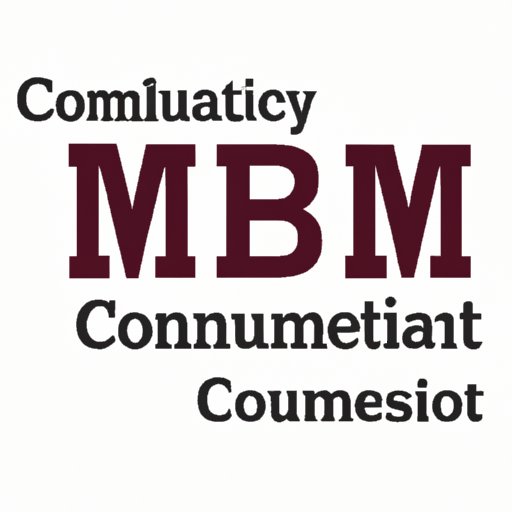Introduction
An MBA degree can be a great investment in your future. But with tuition costs ranging from tens of thousands to hundreds of thousands of dollars, it’s important to understand what you’re getting into before committing to the program. In this article, we explore the cost of an MBA degree, including tuition costs, fees, and other associated expenses.

A Comprehensive Guide to MBA Tuition Costs
According to the Graduate Management Admission Council (GMAC), the average tuition for a full-time MBA program in the United States is $77,000. However, tuition costs can vary greatly depending on the school and program. For example, the tuition for a top-tier business school may be up to $150,000, while some online programs can be as low as $20,000.
In addition to tuition, there are other costs that may be associated with earning an MBA. These include the cost of living, which can range from $5,000 to $15,000 per year and other fees such as technology fees, books and course materials, and travel expenses.
Breaking Down the Cost of an MBA
Tuition is the largest expense associated with earning an MBA degree. Depending on the school, tuition can range from $20,000 to $150,000. In addition to tuition, there are other fees associated with the program, such as books and course materials, technology fees, and travel expenses.
Books and course materials can add up quickly, ranging from a few hundred dollars to several thousand dollars. Technology fees can also be costly, ranging from $500 to $1,000. And depending on the program, students may need to travel for internships or other educational experiences, which can add to the overall cost of the program.

The Financial Impact of an MBA Degree
The financial impact of an MBA degree can vary depending on the program and the individual. According to the GMAC, the average salary increase for MBA graduates is 32%, meaning that graduates can expect to make significantly more money than they did prior to earning their degree. In addition, many schools offer loan repayment options for graduates who are unable to pay off their loans right away.
Exploring the High Price Tag of an MBA
The high price tag of an MBA can be intimidating. While the degree can open up new career opportunities and increase salaries, there are also drawbacks. For example, the cost of the degree can be prohibitively expensive, and some students may find the workload overwhelming. In addition, the traditional MBA program may not be the best fit for everyone – some students may choose to pursue alternative paths, such as executive education or specialized master’s degrees.
Is an MBA Worth the Cost?
When determining whether an MBA degree is worth the cost, it’s important to consider the return on investment. According to the GMAC, the average salary increase for MBA graduates is 32%. This means that, on average, graduates can expect to make significantly more money than they did prior to earning their degree. In addition, many schools offer loan repayment options for graduates who are unable to pay off their loans right away.
However, the financial benefits of an MBA go beyond salary increases. Many graduates report feeling more confident in their abilities and being better prepared to tackle complex business problems. An MBA can also provide access to a network of peers and professionals that can help further advance careers.

Evaluating the Value of an MBA
When considering whether an MBA degree is worth the cost, it’s important to evaluate the value of the degree based on personal values and professional goals. For some, the degree may be well worth the cost, while for others, the cost may be prohibitively expensive. It’s important to consider all factors before making a decision.
What Are the Hidden Costs of an MBA?
In addition to tuition and other fees associated with the program, there are other costs associated with earning an MBA degree that may not be immediately obvious. These include lost wages, as many MBA students choose to leave their current jobs to pursue the degree. There are also opportunity costs, such as the time spent studying and researching instead of working.
Conclusion
An MBA degree can be a great investment in your future. However, it’s important to understand the associated costs before committing to the program. Tuition costs can vary greatly depending on the school and program, and there are other associated expenses such as books and course materials, technology fees, travel expenses, and lost wages. When evaluating the cost of an MBA, it’s important to consider both the financial and non-financial benefits of the degree, as well as personal values and professional goals.
(Note: Is this article not meeting your expectations? Do you have knowledge or insights to share? Unlock new opportunities and expand your reach by joining our authors team. Click Registration to join us and share your expertise with our readers.)
